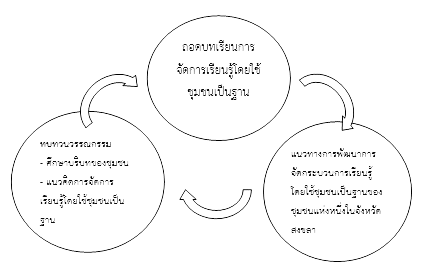Wannisa Junhom Best Practices in Community-Based Learning Process Management: Insights from a Case Study in Songkhla Province
Main Article Content
Abstract
DOI : 10.14456/pnuhuso.2024.7
This study employs a qualitative research approach aimed at distilling valuable insights into organizing learning process within a community framework and exploring strategies for enhancing the learning process through community-based initiatives. The data sources for this study comprised ten individuals, including two community leaders, five organizers involved in the community learning process, two participating teachers, and one staff member from a private organization. These information providers were purposefully selected through purposive sampling. Data collection was conducted through a combination of participant observation, group discussions, and in-depth interviews.
The research findings revealed key success factors in the management of community-based learning process within a community situated in Na Thap Subdistrict, Chana District, Songkhla Province. The identified lessons are outlined as follows: 1) The community boasts a wealth of cultural heritage that has been passed down through successive generations. 2) The community features captivating natural attractions. 3. Community members proactively orchestrate the learning process with enthusiasm and a sense of pride. 4. Residents within the community exhibit a positive and receptive attitude toward learning. 5. The initiative serves as a source of inspiration and facilitates opportunities for children and youth to participate in learning and skill development. Nevertheless, there are areas for further development or enhancement, including: 1) Enhancing learning engagement by actively encouraging participants to pose and answer questions. 2) Addressing the need for a more systematic approach to the community’s learning process. 3) Rectifying the absence of appropriate media or tools for organizing and facilitating the learning process. 4) Addressing the limitation in the number of community educators. 5) Fostering opportunities for learners to reflect on their educational experiences. 6) Rectifying deficiencies in preparing and optimizing the learning environment. Regarding guidelines for the development of the learning process organization, the following recommendations are suggested: 1) Provide training programs to enhance the capabilities of community educators. 2) Establish collaborations with schools to formulate a comprehensive handbook for organizing the learning process. 3) Create age-appropriate learning materials to enhance educational effectiveness. 4) Develop facilities to ensure readiness for organizing the learning process.
Article Details

This work is licensed under a Creative Commons Attribution-NonCommercial-NoDerivatives 4.0 International License.
References
ดิษยุทธ์ บัวจูม, อังศินันท์ อินทรกำแหง, พรรณี บุญประกอบ และสุภาพร ธนะชานันท์. (2557). การพัฒนารูปแบบการจัดการเรียนรู้โดยใช้ชุมชนเป็นฐาน เพื่อสร้างความสนใจและทักษะในอาชีพท้องถิ่นของนักเรียนโรงเรียนบ้าน พะแนงวิทยา. วารสารพฤติกรรมศาสตร์ มหาวิทยาลัยศรีนครินทรวิโรฒ, 20(2), 18-36. https://so06.tci–thaijo.org/index.php/BSRI/article/view/20138
วรรณิศา จันทร์หอม. (2561). ทะเลคือชีวิตของเรา 3. มูลนิธิภาคใต้สีเขียว.
วิจารณ์ พานิช. (2555). วิถีการสร้างการเรียนรู้เพื่อศิษย์ในศตวรรษที่ 21. มูลนิธิสดศรีสฤษดิ์วงศ์.
ศรีวรรณ ฉัตรสุริยวงศ์ และมาเรียม นิลพันธุ์. (2559). กระบวนทัศน์การจัดการเรียนรู้โดยใช้ชุมชนเป็นฐานเพื่อส่งเสริมความสามารถด้านการติดอย่างมีวิจารณญาณและการแก้ปัญหาเชิงสร้างสรรค์สำหรับนักเรียนระดับประถมศึกษา. วารสารศิลปากรศึกษาศาสตร์วิจัย, 8(1), 183-197. https://so05.tci-thaijo.org/index.php/suedureasearchjournal/article/view/ 34694
ศุภวัลย์ พลายน้อย. (2562). นานาวิธีวิทยาการถอดบทเรียนละการสังเคราะห์ความรู้. ศูนย์พัฒนาศักยภาพภาคีด้านการสร้างเสริมสุขภาพ.
George, A. L., & Bennett, A. (2005). Case Studies and Theory Develoment in the Social Sciences. The Belfer Center for Science and International Affairs.
Reid, A. J. (1996). What we want: Qualitative research. Canadian Family Physician, 42.
Saavedra, A.R., & Opfer, V. D. (2012). Teaching and learning 21st century skills: Lessons from the learning sciences. https://asiasociety.org/education/teaching-and-learning-21st-century-skills
Silverman, D. (2001). Interpreting qualitative data: Methods for analyzing talk, text and interaction (2nd ed.). CA: Sage.
บุคลานุกรม
ผู้นำกลุ่มองค์กรในชุมชนคนที่ 1 (ผู้ให้สัมภาษณ์), วรรณิศา จันทร์หอม (ผู้สัมภาษณ์), ที่ชุมชนแห่งหนึ่งในตำบลนาทับ อำเภอจะนะ จังหวัดสงขลา, เมื่อวันที่ 25 กันยายน 2566.
ผู้นำกลุ่มองค์กรในชุมชนคนที่ 2 (ผู้ให้สัมภาษณ์), วรรณิศา จันทร์หอม (ผู้สัมภาษณ์), ที่ชุมชนแห่งหนึ่งในตำบลนาทับ อำเภอจะนะ จังหวัดสงขลา, เมื่อวันที่ 25 กันยายน 2566.
เจ้าหน้าที่องค์กรพัฒนาเอกชน (ผู้ให้สัมภาษณ์), วรรณิศา จันทร์หอม (ผู้สัมภาษณ์), ที่ชุมชนบ้านนา ตำบล บ้านนา อำเภอจะนะ จังหวัดสงขลา, เมื่อวันที่ 26 กันยายน 2566.
ครูที่เคยเข้าร่วมกระบวนการคนที่ 1 (ผู้ให้สัมภาษณ์), วรรณิศา จันทร์หอม (ผู้สัมภาษณ์), ที่ชุมชนบ้านนา ตำบลบ้านนา อำเภอจะนะ จังหวัดสงขลา, เมื่อวันที่ 26 กันยายน 2566.
ครูที่เคยเข้าร่วมกระบวนการคนที่ 2 (ผู้ให้สัมภาษณ์), วรรณิศา จันทร์หอม (ผู้สัมภาษณ์), ที่ชุมชนบ้านนา ตำบลบ้านนา อำเภอจะนะ จังหวัดสงขลา, เมื่อวันที่ 26 กันยายน 2566.
ผู้จัดกระบวนการเรียนรู้ในชุมชนคนที่ 1 (ผู้ให้สัมภาษณ์), วรรณิศา จันทร์หอม (ผู้สัมภาษณ์), ที่ชุมชนแห่งหนึ่งในตำบลนาทับ อำเภอจะนะ จังหวัดสงขลา, เมื่อวันที่ 29 กันยายน 2566.
ผู้จัดกระบวนการเรียนรู้ในชุมชนคนที่ 2 (ผู้ให้สัมภาษณ์), วรรณิศา จันทร์หอม (ผู้สัมภาษณ์), ที่ชุมชนแห่งหนึ่งในตำบลนาทับ อำเภอจะนะ จังหวัดสงขลา, เมื่อวันที่ 29 กันยายน 2566.
ผู้จัดกระบวนการเรียนรู้ในชุมชนคนที่ 3 (ผู้ให้สัมภาษณ์), วรรณิศา จันทร์หอม (ผู้สัมภาษณ์), ที่ชุมชนแห่งหนึ่งในตำบลนาทับ อำเภอจะนะ จังหวัดสงขลา, เมื่อวันที่ 29 กันยายน 2566.
ผู้จัดกระบวนการเรียนรู้ในชุมชนคนที่ 4 (ผู้ให้สัมภาษณ์), วรรณิศา จันทร์หอม (ผู้สัมภาษณ์), ที่ชุมชนแห่งหนึ่งในตำบลนาทับ อำเภอจะนะ จังหวัดสงขลา, เมื่อวันที่ 29 กันยายน 2566.
ผู้จัดกระบวนการเรียนรู้ในชุมชนคนที่ 5 (ผู้ให้สัมภาษณ์), วรรณิศา จันทร์หอม (ผู้สัมภาษณ์), ที่ชุมชนแห่งหนึ่งในตำบลนาทับ อำเภอจะนะ จังหวัดสงขลา, เมื่อวันที่ 29 กันยายน 2566.


